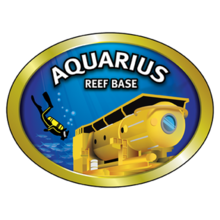Aquarius (laboratory)
 |
|

Aquarius on Conch Reef, off the Florida Keys
|
|
| Established | 1986 |
|---|---|
| Research type | Underwater research and ocean exploration |
| Location | Florida Keys, Florida |
|
Operating agency
|
Florida International University |
| Website | Aquarius Reef Base |
The Aquarius Reef Base is an underwater habitat located 5.4 miles (9 kilometers) off Key Largo in the Florida Keys National Marine Sanctuary. It is deployed on the ocean floor 62 feet (19 meters) below the surface and next to a deep coral reef named Conch Reef.
Aquarius is one of three undersea laboratories in the world dedicated to science and education. Two additional undersea facilities, also located in Key Largo, FL are owned and operated by Marine Resources Development Foundation. Aquarius was owned by the National Oceanic and Atmospheric Administration (NOAA) and operated by the University of North Carolina–Wilmington until 2013 when Florida International University assumed operational control.
Florida International University (FIU) took ownership of Aquarius in October 2014. As part of the FIU Marine Education and Research Initiative, the Medina Aquarius Program is dedicated to the study and preservation of marine ecosystems worldwide and is enhancing the scope and impact of FIU on research, educational outreach, technology development, and professional training. At the heart of the program is the Aquarius Reef Base.
Aquarius, designed by Perry Submarine Builders of Florida and constructed by Victoria Machine Works, was built in Victoria, Texas, in 1986. Its original name was "the George F. Bond", who was the father of Sealab in particular and saturation diving in general. Underwater operations were first planned for Catalina Island, California, but were moved to the U.S. Virgin Islands. Following Hurricane Hugo in 1989, Aquarius was taken to Wilmington, NC for repairs and refurbishment and was redeployed in the Florida Keys in 1993. Aquarius is located under 20 m (66 ft) of water at the base of a coral reef within the Florida Keys National Marine Sanctuary, an ideal site for studying the health of sensitive coral reefs.
...
Wikipedia
